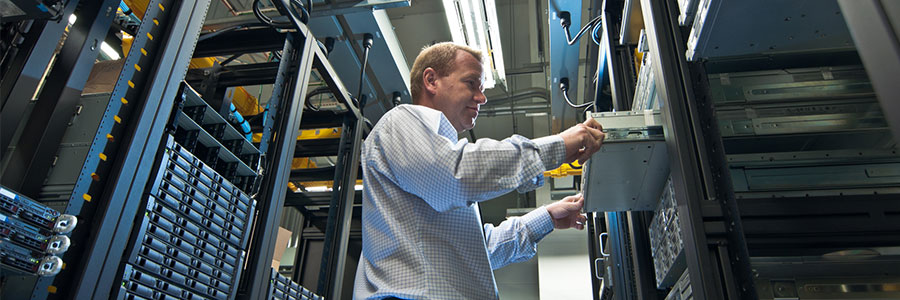Data centers are the heart of any business’s IT infrastructure because they contain the critical hardware that stores and processes data and host the systems that allow your business to function. However, data centers can be incredibly costly, requiring extensive capital investments, maintenance, and specialized personnel to manage them. Additionally, data centers require physical space and infrastructure (for power, internet, and cooling), which may push or exceed the limits of your premises.
These and other reasons are why colocation is such a great alternative to data centers for businesses today.
What is colocation?
In a colocation setup, customers rent space for their servers and networking hardware from a colocation provider, who manages the data centers, including its power, network access, security, and other components.
Why is colocation great for business?
As mentioned, there are many advantages to using colocation, and these include:
Cost savings
One of the primary benefits of colocation is the significant cost savings it brings. When enterprises partner with a colocation provider, they don’t have to make the substantial capital expenditures that typically come with building and maintaining an on-premises data center. This results in a more predictable and scalable financial approach, enabling businesses to align their IT expenses with actual usage. Beyond infrastructure costs, colocation increases savings through efficient power and cooling practices, as well as reduced staffing expenses, given that routine maintenance is handled by the provider.
Less downtime
Colocation helps reduce downtime events by employing redundancies, including redundant power and cooling systems, multiple power feeds, emergency generators, and access to multiple simultaneous carriers. These measures ensure resilience against disruptions, especially as colocation facilities are often equipped to endure various natural disasters. Colocation providers typically offer a reliable uptime service level agreement (SLA) to support their commitment to reliability.
Security
To prevent data breaches, colocation facilities offer security measures that often exceed the capabilities of most on-premises setups, such as:
- Multilayered physical security, including biometric access controls, video surveillance, and 24/7 manned security
- Digital security, consisting of advanced cybersecurity protocols, intrusion detection systems, and firewalls to shield your data from ever-evolving cyberthreats
Scalability
Traditional data center setups can often become rigid and hinder your ability to scale up with your expanding needs or scale down to suit market conditions. Colocation allows you to seamlessly adjust your IT infrastructure by adding or removing server space as your business evolves. This flexibility empowers you to capitalize on new opportunities and adapt to changing market demands without worrying about infrastructure limitations.
IT expertise
With the ongoing shortage of IT professionals, colocation offers businesses access to a team of certified experts. These professionals not only monitor and maintain the data center, but they also assist organizations with the design, implementation, and management of IT strategies.
Regulatory compliance
Colocation data centers contribute significantly to improving enterprise compliance posture. Through thorough audits and adherence to standards such as SOC 2, HIPAA, and PCI DSS, colocation providers assure businesses that their data is handled in line with the highest security standards.
Freedom to focus on business goals
Managing your own data center can be a resource-intensive endeavor, diverting your valuable IT professionals’ focus from core business initiatives. Colocation frees your internal IT team from managing day-to-day maintenance and security, allowing them to focus on strategic pursuits, including innovation, customer service, and business growth. With colocation, you gain access to a team of experienced IT professionals who become an extension of your own, ensuring your infrastructure runs smoothly.
Improved backup and disaster recovery
Colocation helps organizations carry out recovery strategies to minimize downtime, reduce data loss, and hasten system recovery during a disaster. In addition, colocation facilities are usually well-secured against most forms of disasters (such as fire and flooding), providing a safe repository to store data backups.
Learn more about colocation and how it can benefit your business by speaking with a Liberty Center One expert. Contact us today.
